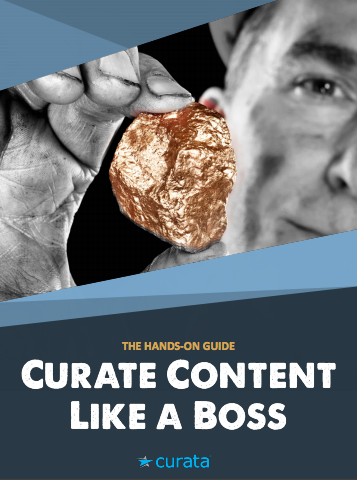- Share How Artificial Intelligence is Changing Content Marketing on Facebook
- Share How Artificial Intelligence is Changing Content Marketing on Twitter
- Share How Artificial Intelligence is Changing Content Marketing on Linkedin
- Share How Artificial Intelligence is Changing Content Marketing via email
Artificial intelligence (AI) has come a long way since Alan Turing first posed the question, “Can machines think?” in 1950.
Computers have since defeated a Russian chess grandmaster at his own game, won at Jeopardy, written a sci-fi screenplay from scratch, and can successfully prompt suggestions every time you make a search engine query.
Machine learning algorithms are enabling marketers to make sense of overwhelming amounts of data and deliver better customer experiences. And to generate content in record time.

The power of artificial intelligence is changing the content marketing landscape for the better. And this is exactly what we’re going to discuss today.
The Role of Artificial Intelligence in Content Marketing
Artificial intelligence refers to machines with capabilities that mimic cognitive functions associated with the human mind—most notably learning and problem solving.
AI already plays a significant role in the field of content marketing, helping to streamline processes at a time of immense content overload.
Here’s a recap of what 60 seconds on the Internet looked like in 2016: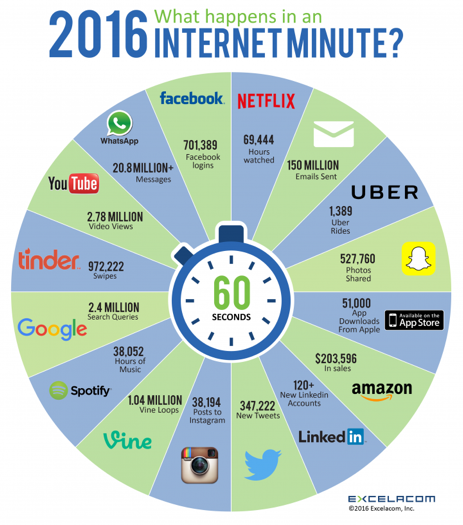
The rules of content marketing change every year. Blog posts are longer now, hyper-focused web pages and personalized advertising have become a necessity, and Google has launched new machine learning updates.
Artificial intelligence is helping marketers decipher the ever-changing world of content marketing by analyzing user data and helping marketers make sense of user intent.

Below are six ways artificial intelligence is changing content marketing.
1. Automatically Generate Content
 With artificial intelligence marketers can automatically generate content for simple stories such as stock updates and sports reports. You’ve probably even read content written by an algorithm without noticing it.
With artificial intelligence marketers can automatically generate content for simple stories such as stock updates and sports reports. You’ve probably even read content written by an algorithm without noticing it.
It may surprise you that the following opening sentence is a sports story written solely by an algorithm:
“Tuesday was a great day for W. Roberts, as the junior pitcher threw a perfect game to carry Virginia to a 2-0 victory over George Washington at Davenport Field.”
Looks like a sentence you’ve read before, right? That’s because machines have been automatically generating content for years. Companies such as the Associated Press, Yahoo, and Fox have been using them for quite some time.
2. Deploy Chatbots to Interact With Users
Chatbots are computer programs that use artificial intelligence to mimic conversation with users. One example is in Facebook Messenger, which uses chatbots to carry out quasi-conversations with users, answering queries and concerns in real time.
Companies such as Uber and 1-800 Flowers use Facebook Messenger chatbots to allow users to request a ride (without having to open the app), or to choose their flower arrangements.
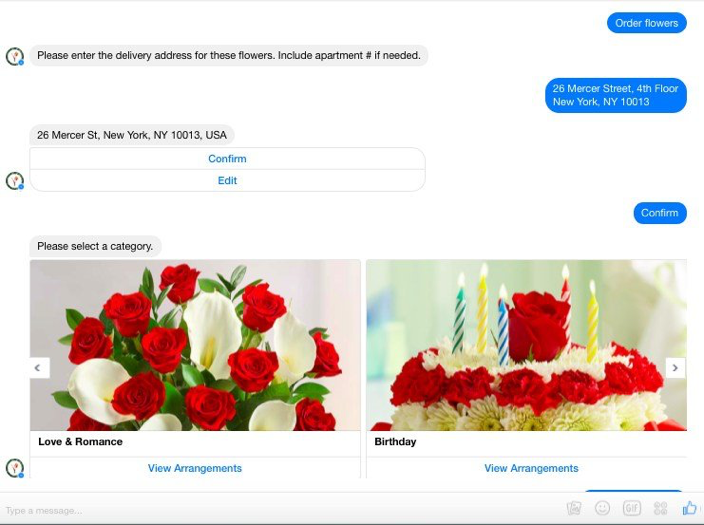
Facebook Messenger chatbots can also be used to send promotional content, if a user initiates the interaction.
Chatbots help streamline the customer support process. Instead of having users fill out a form, they can just type in their query and get an answer in real time.
3. Custom News Feed Algorithms
Artificial intelligence enables social networks such as Facebook, Twitter, and Instagram to customize users’ news feeds. This allows them to only see the posts they’re interested in.
These social networks analyze literally hundreds of variables, and can predict with reasonable accuracy which posts a user will like, comment, hide, or mark as spam. Algorithms also give relevancy scores to social media ads so users only see the ads they might be interested in.
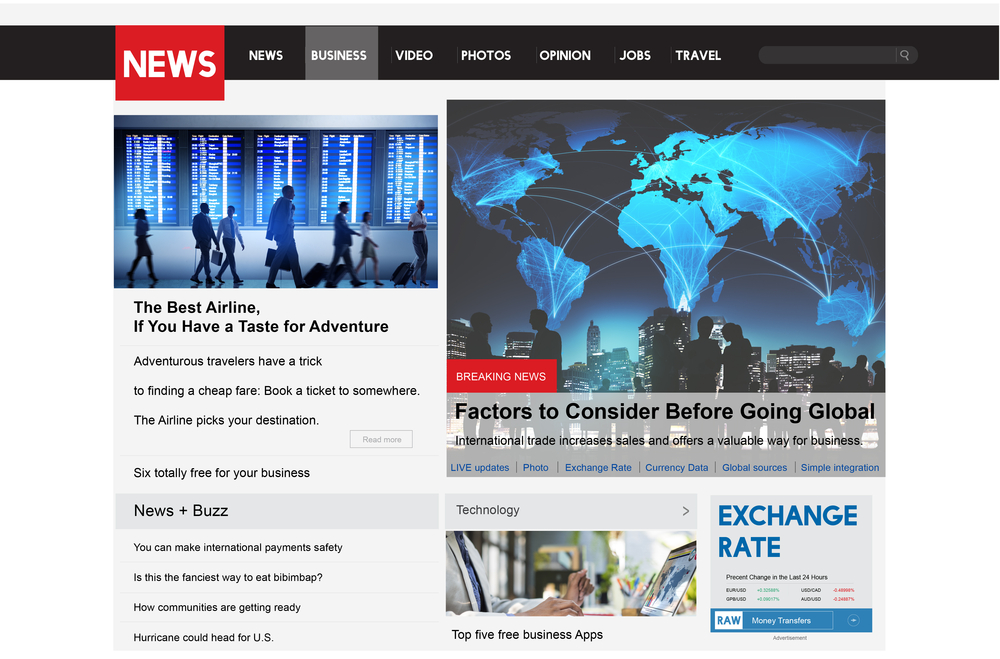
This information helps marketers understand which type of content visitors find engaging. This in turn helps marketers create similar content to increase their social engagement. Knowing which ads your target audience are likely to click also helps you create your own Facebook advertisements.
4. Predictive Intelligence
Predictive intelligence makes businesses more efficient. It helps companies understand an individual customer and personalize content that appeals to their needs and interests.
It also greatly affects lead scoring—a points system used to determine where your prospects are in the buyer journey. Predictive lead scoring allows marketers to fast-track the sales process by ascertaining which customers are ideal to convert, depending on their past behaviors and history.
According to a recent Gartner study, “Predictive Lead Scoring Can Yield Significant ROI for Technology Provider Marketers, Even for Lower Lead Volumes.”
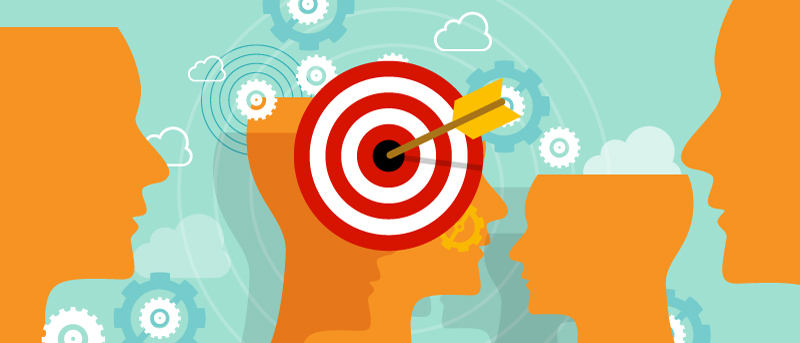
Predictive intelligence also gives marketers insight into which content pieces to target to which customers. When you understand where users are in the buyer journey (via predictive lead scoring), you can apply that information to target the specific style of content they are most likely to engage with.
Seeing which content an audience positively responds to helps you create future content that yields better results.
5. Curate and Create Content
Content curation is when an individual (or team) consistently finds, organizes, annotates, and shares the most relevant and highest quality digital content on a specific topic for their target market. (Become a curation pro—download The Ultimate Guide to Content Curation eBook.)
Curating engaging and relevant content on a regular basis is no easy task. However, tools like BuzzSumo help with researching which topics are trending. It still takes significant time and energy to sift through content though. Let alone to curate something that’s both relevant to what your audience wants to read, and is also engaging.
Ultimately, we don’t create content just for the sake of creating content. Our goal is to move a prospect through the awareness stages, so that they are more likely to buy our product. Artificial Intelligence helps marketers create relevant content for their audiences at each stage of the marketing funnel.
Algorithms make it easier to collect data on about a target audience. This can include what they like to read, which questions they want answered, and any concerns they have about your specific business. Armed with this knowledge you can then curate and create content that is relevant and answers their questions. This boosts engagement and ultimately conversion for any offers you advertise to them.
6. Creating a Better Customer Experience
You’ve likely heard of IBM’s Watson, the computer that thinks. Contrary to Siri and Cortana, Watson doesn’t just make suggestions based on what it learns from requests and questions. Watson also has the ability to process language commands and respond to them in a human-like manner, either verbally or via text. Watson is AI because it understands, reasons, learns, and interacts.
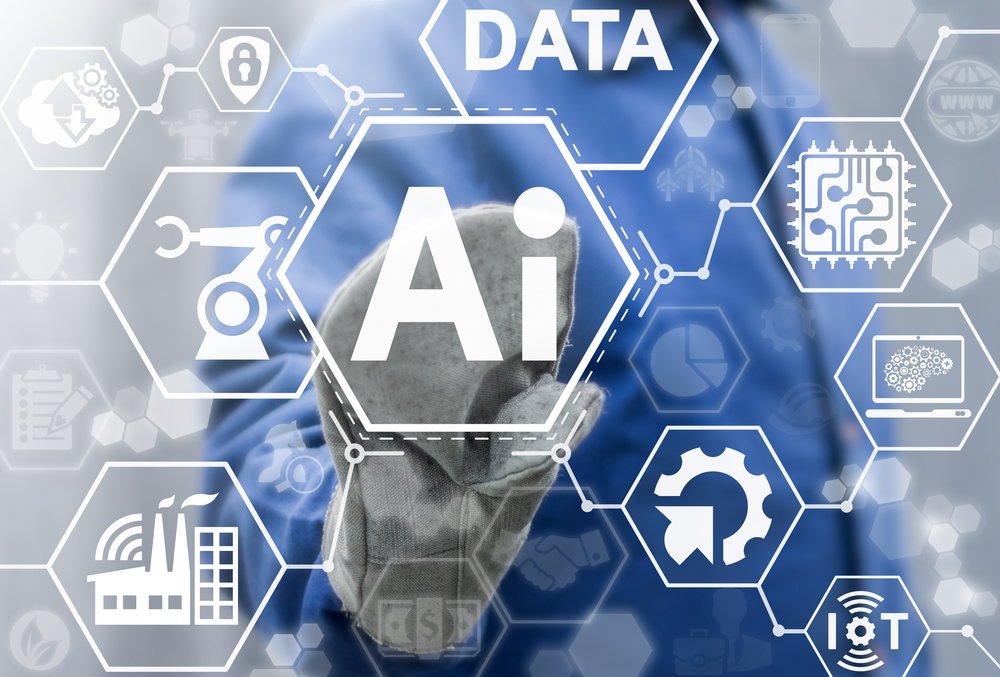
Watson’s AI can also be used for IA—Intelligent Assistance.
Imagine one of your users interacting with an intelligent computer to solve a problem instead of filling out a standard form. Watson will not only be able to help them with their immediate query. He’ll be able to direct them to relevant marketing materials that the user may need in the future.
Two great examples that demonstrate the power of artificial intelligence are The North Face and Hilton Hotels. The North Face uses a bot that attempts to recreate the store shopping experience. The bot asks a small series of questions to shoppers about their jacket preferences, and recommends options based on the user’s selections.

Similarly, Hilton Hotels Connie is a concierge robot that interacts with guests and assists them with their queries:
Watson opens a world of possibilities for personalization. It uses AI to give a person the right message at the right time when you don’t even know them.
AI helps you understand your audience based on collected data, and allows you to create and target personalized, dedicated pages for them. Personalized landing pages answer visitors’ questions through the landing page elements. They’re then more likely to click a call-to-action button and fulfill your conversion goal.
Artificial Intelligence Facilitates Better Marketing
Artificial intelligence enables marketers to focus more on the customer and take care of their needs in real time. Data that algorithms collect and generate makes it easy for marketers to understand what content to target at customers, and which channel to use at which time.
The personalized experiences that AI facilitates makes users feel more at ease—and more likely to buy what you have to offer.

Of course, the best technology won’t help you much if you don’t have a strategy for how to use it. To find out how to construct a smart, effective content marketing strategy, download The Content Marketing Pyramid eBook. It provides a clear, comprehensive framework to develop and execute a winning content marketing strategy.






